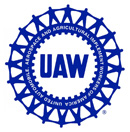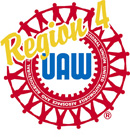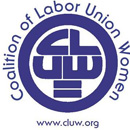If you have any questions about CAP please contact your local Chairman, Cory Nathan

What is CAP
- Community Action Program (CAP) is a Department of the UAW International Union. It is not a political party, nor is it tied to any party. It is the nonpartisan political arm of the UAW. It endorses candidates for public office on the basis of their record and programs - not the party - utilizing a structure of 160 CAP councils across the nation and acting upon their recommendations and endorsements.
- Presidential and Vice-Presidential endorsements are made by the International Executive Board of the UAW acting upon the secret ballot recommendations of all the UAW Local Unions across the nation.
- Many people think that we are trying to tell people how to vote. This is simply not true. Many of our members think that part of their union dues go to political groups. That is not the case.
What CAP Does
- CAP helps register Union members and their families so they can vote and make their voices heard.
- CAP distributes the voting of candidates to members so they can be informed voters.
- CAP endorses candidates on the basis of their voting records and/or their programs - not on the basis of their party affiliation.
- CAP conducts voluntary V-CAP Check-off drives asking our members to contribute to V-CAP. Federal law prohibits the use of dues funds as contributions to candidates for federal and some state offices.
- CAP contributes to endorsed candidates from funds collected in voluntary dollar drives.
- CAP urges Union members, their families and friends to vote.
- Most of CAP’s political efforts are done by volunteers - Union members, friends and families - who put in many hours phone banking, door knocking, literature drops, and getting out the vote on Election Day.
- In addition, CAP involves itself in many local community projects helping to bring about a better quality of life where our members live and work.
-
CAP does not tell anyone how to vote.
- CAP does not force any Union member to participate in V-CAP.
- CAP does not use dues money to make contributions to federal or state candidates (only moneys raised from V-CAP drives or raffles can be used).
V-CAP Check-off
- The UAW's V-CAP Check off is a voluntary program that allows you to make a modest contribution each month to help your Union support candidates who stand up for American workers and their jobs.
- By law, Union dues can't be used to support any federal candidate, and in an ever-increasing number of states, any candidate for public office. Our only means of monetary support for many labor-endorsed candidates is voluntary political contributions which are put into the International Union's political action fund, UAW V-CAP.
- If you are interested in having a voice in how the government is run, consider contributing to the V-CAP Check-off.
- Realizing that what is gained at the Bargaining table can be taken away with a stroke of a pen at the Legislative Conference tables, and it is all of our jobs to be committed to defending politically what is gained collectively!
Why Labor Is In Politics
- Labor Unions have always been under constant attack from business, industrial organizations and often from state and national legislatures and political leaders. Every time the US Congress or a state legislature opens a new session, a flood of bills intended to restrict the rights of workers and their families are introduced.
- Workers have learned through bitter experience that there is a powerful link between the bread box and the ballot box. Gains won at the bargaining table or through sacrifice on the picket line can be wiped out by unwise actions of state or national legislatures and political leaders - that today's wage increase can be erased by taxes or inflation, or your job vanish in a wave of unemployment. Thus, unions are in politics to protect the welfare and security of their members.
You can become involved
- Participate in CAP programs in your local Union.
- Help in voter registration and get-out-the-vote.
- Work to help the election of CAP endorsed candidates.
- Most importantly VOTE for candidates that have proven and will continue to stand up for workers’ rights to help secure a future for you and your family.
-
Voting - Promote participatory democracy and full suffrage by simplifying, streamlining. and making uniform standards for the registration and voting process. Establish an Election Day holiday for all Americans; pass campaign finance reform; and ultimately replace the current system dominated by corporations and the wealthy with the public financing of campaigns.
- Organizing - Establish for every worker the real right to organize and belong to a union, complete with effective enforcement and penalties for employer interference.
- Freedom Abroad - Peacefully promote democracy, human rights, collective bargaining rights, and economic development worldwide through the inclusion of strong, enforceable labor and environmental standards in all trade agreements; oppose the Free Trade Agreement of the Americans (FTTA); repeal the North American Free Trade Agreement (NAFTA); promote international solidarity and oppose child labor.
-
Healthcare - Establish universal access to affordable quality healthcare through a single payer system; in the immediate, fully fund and strengthen Medicare; add a real prescription drug benefit for seniors; and extend Medicare coverage to children; pass a Patient's Bill of Rights.
-
Retirement Security - Preserve Social Security as a safety net for retirement; promote defined benefit pension plans; protect 401 (k) plans; promote early retirement.
-
Education - Increase funds for education including building improvement, teacher pay, textbook funding; and preschool/before and after school programs; limit class size; make higher education affordable and expand tuition assistance.
-
On the Job - Establish an ergonomics standard; increase funding for OSHA enforcement; and extend family and medical leave to all workers with provision for wage replacement.
Equality and Dignity - The right to equal opportunity
- Dignity - End discrimination in the workplace, housing, and society.
- Job Fairness - Equal pay for equal work.
- Fight Prejudice - Vigorous prosecution of hate crimes; elimination of sexual harassment; abolish racial profiling; promote diversity.
Economic Rights - The right to participate in a fair and just economy
- Living Wage - Establish a living wage for all Americans; in the immediate, increase the minimum wage and enact automatic cost of living adjustments.
- Shorter Work Hours - Strengthen wage and hour standards and reduce the standard workweek with no loss of pay; promote full employment and increase and extend unemployment insurance.
- Fair Taxes - Reestablish a progressive tax system including taxes on inherited wealth; repeal the Bush tax cuts for the wealthiest 1%; close tax loopholes for corporations such as offshore tax evasion schemes; return tax rates to their more equitable 1950s levels for corporations and the wealthy.
Community Values - The right to a safe and secure community
- Public Space - Increase funding for parks, transportation, and other infrastructure improvements; full training and collective bargaining rights for public employees; community policing; no privatization of public services; provide affordable housing.
- Healthy Environment - Effective regulation of polluters including new laws, increased enforcement of existing law, and funding for technologies to safeguard our air and water.
Does it really make any difference who is elected and who makes the laws? Take a minute to review the questions below and determine whether you think they are affected by politics.
1. Between the time you wake up and the time you leave the house, several things usually happen to you. Do you think any of the following activities are affected by politics?
-
The water with which you wash your face and brush your teeth.
-
The electricity which lights the room.
-
The price and quality of food you have for breakfast.
-
The safety of the products you buy.
2. Most of our waking time is spent at work or travelling to and from the job. Which typical incidents listed below are affected by politics?
-
Your method of transportation to work.
-
The safety conditions under which you work.
-
Your membership in a Union and the right to bargain collectively.
-
The income you receive when you are unemployed.
3. We value our leisure time and the chance to get away from it all. Are any of the following activities affected by politics?
-
The parks and lakes where vacationers' fish and swim.
-
The air you breathe.
-
The radio and TV programs that entertain you.
4. Most of us want to see our children properly prepared to take on the responsibilities of adulthood? Are any of these experiences affected by politics and why?
-
The elementary school experience.
-
The potential high school dropout.
-
The chance for education and training beyond high school.
5. As the average person's life span grows longer and as the retirement age is lowered, these later years become more meaningful. Are any of the following decisions affected by our political system?
-
The elementary school experience.
-
The potential high school dropout.
-
The chance for education and training beyond high school.
6. Most of us want to have extra money in our pockets and pay lower taxes. Are any of the following offices affected by our political system?
-
The National Labor Relations Board.
-
The Occupational Safety and Health Administration.
-
Social Security
- Medicare











